12 Best Natural Supplements for Anxiety in 2023
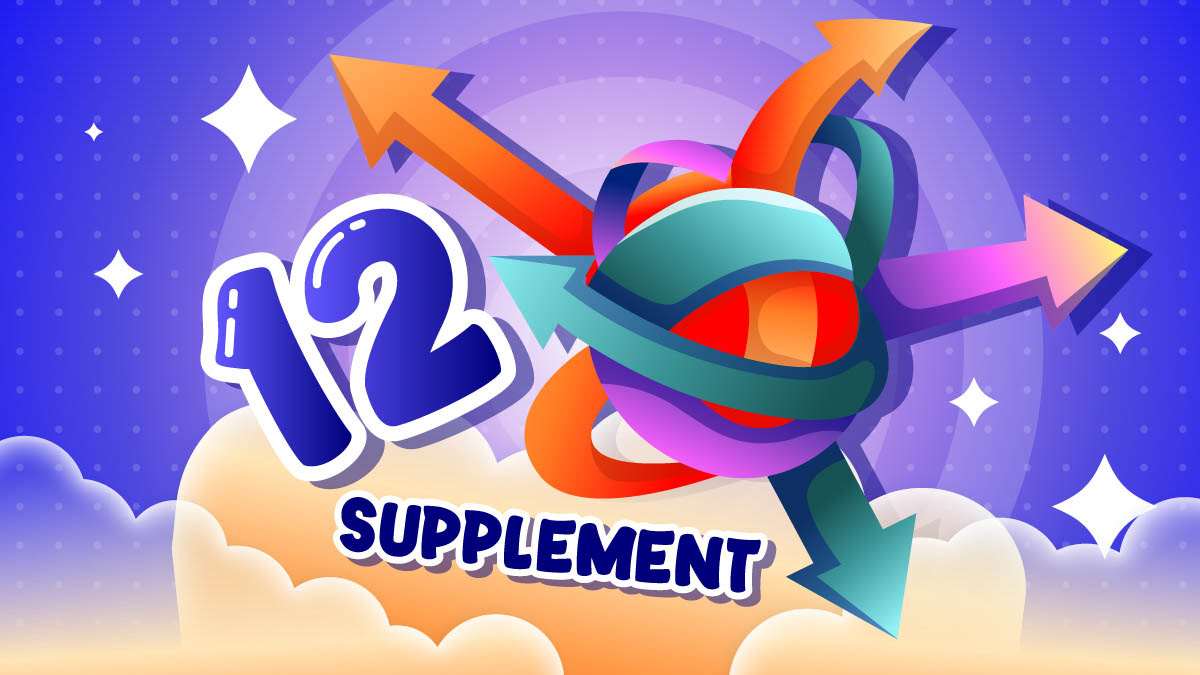
This article covers the top 12 best natural supplements for anxiety. We include products we believe are useful for our readers based on scientific studies, anecdotal reports, and our own experience. You’ll also learn from our playbook on buying health supplements to ensure you’re making a safe decision each time you look for natural anti-anxiety remedies.
Anxiety is one of the most common mental health conditions, affecting over 33% of people in their lifetime.
Anxiety disorders range from generalized anxiety disorder (GAD), panic disorder with or without agoraphobia, separation anxiety disorder, specific phobias, and social anxiety disorder (SAD).
The most effective way to treat anxiety is through cognitive-behavioral therapy. Medication and nutritional supplements are sometimes used to enhance the efficacy of the treatment.
Research also suggests making dietary changes, including the transition from processed food to whole foods, and taking additional vitamins and minerals to level deficiencies that may trigger anxiety disorders.
In this article, we break down the best natural supplements for anxiety — and how to use them to reap the most benefits.
Best Natural Supplements for Anxiety
If you’re wondering how supplements may help you reduce anxiety, here’s a little help from us. We’ve highlighted 13 of our top choices, including specific products we use and recommend.
The supplements on this list were selected based on the following criteria:
- Safety: your anti-anxiety supplements should be biologically appropriate and safe to use in the long run.
- Efficacy: the main ingredients should be supported by current research
- Quality: we picked the supplements that prioritize high-quality ingredients.
Off we go.
Ashwagandha
Ashwagandha has been used for centuries in Ayurvedic medicine. It’s gained a reputation as one of the best supplements for stress and anxiety thanks to its adaptogenic properties.
While studies into the benefits of ashwagandha are still in their infancy, they look promising. In a small 2019 study, ashwagandha was found to be safe and effective in relieving stress and anxiety (1).
The optimal dosage of ashwagandha for stress varies between individuals. It’s best to consult it with a holistic doctor if you’re looking for professional guidance on dosing adaptogens.
GABA
GABA is an inhibitory neurotransmitter that slows down the nervous system and prevents overexcitation.
Low GABA levels are associated with aggravated anxiety, depression, ADHD, and poor stress response.
Increasing these concentrations with GABA supplements makes you calmer and more resistant to stress and distractors.
In one study, increased GABA levels improved social interactions in people with autism (2). The research team concluded that GABA supplements offer a promising avenue for treating neurological disorders.
Medicinal Mushrooms
Hold your horses, these aren’t psychedelic shrooms but rather versatile adaptogens that optimize stress responses and promote neurogenesis in the brain (3).
Adding mushrooms, such as cordyceps, lion’s mane, and reishi, can act on several neurotransmitters that regulate mood and emotional processing, such as serotonin, dopamine, endocannabinoids, oxytocin, and acetylcholine.
Another profound benefit of medicinal mushrooms is that they reduce inflammation in the brain. Chronic inflammation may also trigger anxiety disorders.
Vitamin C
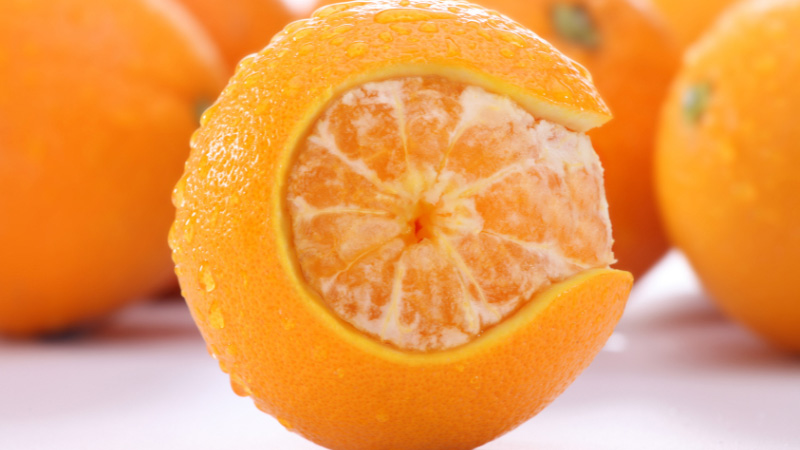
A potent antioxidant, vitamin C protects cells against damage and degeneration. Some studies have found vitamin C to be effective in treating symptoms of anxiety in humans regardless of their age.
A 2015 study examined high school students who took 500 mg of vitamin C each day for 2 weeks and successfully reduced anxiety levels (4).
Research from 2013 and 2017 stacks the evidence, suggesting that vitamin C supplements provide relief from anxiety in people with diabetes (5, 6).
Your daily vitamin C intake depends on your age. You can generally get the recommended levels by eating berries, citruses, and herbs that are high in vitamin C.
Magnesium
Magnesium is an essential mineral that regulates almost every function in your body, from blood pressure to muscle function to sleep and stress response. Healthy magnesium levels help you achieve a good basal metabolic rate and help your body efficiently process amino acids, fats, and carbohydrates.
Magnesium supplements are generally safe. In a 2017 review of the scientific literature, the authors reported that magnesium supplements could have a positive impact on people struggling with anxiety, but they also called for more high-quality studies (7).
The dosage is determined mainly by your age and sex. Adult men should consume 400-420 mg of total magnesium (from diet and supplements) a day, while women should do well on 310-320 mg a day (8).
Vitamin D
Vitamin D is actually more of a hormone than a vitamin. It’s an essential component that helps balance mood, regulates brain function, and strengthens immune response on top of other biological processes. Your body naturally synthesizes vitamin D when you expose it to sunlight. You can also get it from certain foods and supplements.
Studies have linked low vitamin D levels with depression. Its deficiencies may also lead to other mood disorders, including anxiety. A 2019 study suggests that vitamin D effectively curbs the symptoms of anxiety disorders. (9)
However, in a 2020 study, vitamin D improved anxiety in patients with deficiencies, but it failed to help with depression. (10)
Vitamin B6 and B12
B vitamins play an essential role in maintaining mental health and reducing anxiety.
A 2022 randomized controlled trial published in Human Psychopharmacology analyzed 478 adults, of whom the majority were female, who took lactose tablets, vitamin B6 tablets, or vitamin B12 tablets for 30 days. The group supplementing B vitamins reported reduced levels of anxiety (11).
However, an earlier review from 2019 found no causality between supplementation with B vitamins and reduced anxiety. Considered together, these studies indicate the need for further research to evaluate which B vitamins, and at what doses, may reduce anxiety (12).
Saffron
Saffron is one of the most expensive spices, but it also comes with a few medicinal properties. Its vividly yellow flowers are a rich source of antioxidants. Saffron supplements may help improve mood when you need to unwind.
A 2018 review of 100 studies ranging from 1996 to 2016 concluded that saffron was one of several plant-based medicines to relieve anxiety (13).
Saffron has also demonstrated similar efficacy to antidepressants in recent clinical trials — but with a shorter list of side effects.
Omega-3s
Omega-3s are essential fatty acids with outstanding anti-inflammatory properties. Your body doesn’t produce them on its own and must source them from food or supplements.
In a 2018 review of 19 clinical trials, omega-3s were shown to significantly reduce anxiety symptoms compared to the control group (14).
Omega-3 supplements seem to reach their peak efficacy at high doses. As the review notes, noticeable anti-anxiety effects were achieved with doses starting at 2,000 mg of omega-3s each day.
Chamomile
If you’ve ever had chamomile tea, you know how calming and soothing it can be. A 2014 study found that chamomile may have anti-anxiety and antidepressant properties that are safe to use in the long term (15).
In addition, a 2016 study concluded that the regular use of chamomile might reduce symptoms of a generalized anxiety disorder (16).
However, more studies are needed to determine the optimal dosage of chamomile for anxiety. Because it comes in many forms — including tea, oils, and capsules — recommended dosages can vary significantly.
It’s best to follow the instructions on the product label or reach out to a doctor for professional advice.
Lavender
Besides its sweet, floral scent, lavender is renowned for its ability to reduce anxiety and induce deep relaxation.
On top of generating a serene state of mind, lavender acts on the body’s fight-or-flight response, hence its impact on anxiety.
Lavender essential oil is known to reduce:
- Agitation
- Restlessness
- Disturbed sleep
- Depressive symptoms
- Nervousness
According to clinical trials and meta-analyses, the most effective form of lavender is aromatherapy, especially for the combined physical and mental benefits (17).
CBD: A Different Approach to Treating Anxiety
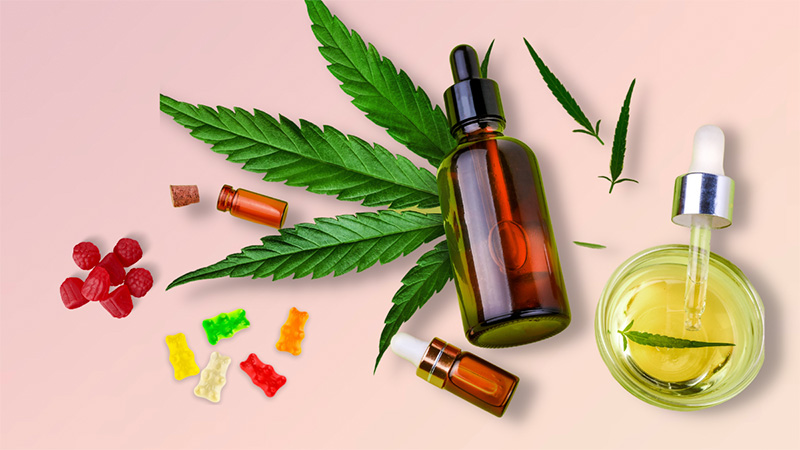
CBD is receiving a lot of buzz in the media, and there’s a good reason for it. It’s one of the most versatile health supplements, and researchers are surprised by its vast influence on mental health.
It has many reported health benefits, including pain relief, treating acne, reducing inflammation, improving focus and memory, and easing anxiety.
A 2020 review of existing studies supported the use of CBD for anxiety, touting the cannabinoid for significant symptom relief for people with a social anxiety disorder (18).
In a 2020 review, the authors also found that CBD can calm a brain in patients with the following conditions (19):
- Panic disorder
- Obsessive-compulsive disorder
- Social anxiety disorder
- Post-traumatic stress disorder
- Generalized anxiety disorder
According to a 2017 review, CBD is safe and well tolerated by humans, even in doses as high as 1,500 mg daily administered for several weeks (20).
However, more research is needed on its interactions with other medications. CBD is a potent inhibitor of the CYP450 enzyme system that metabolizes the majority of pharmaceutical drugs (21).
Best CBD Supplements for Anxiety
The best CBD oils for anxiety contain a full-spectrum CBD extract and are infused with other synergistic ingredients to increase the product’s efficacy.
Popular ingredients in relaxing CBD supplements include:
- GABA
- 5-HTP
- Lemon Balm
- CBC
- Calming terpenes (myrcene, linalool, humulene)
- L-theanine
It’s important to purchase only from reputable suppliers who can provide batch-specific certificates of analysis (CoAs) from a third-party laboratory. The CBD market is underregulated, and despite its maturity, there are still plenty of fly-by-night companies mooching on the booming market and unaware consumers.
Below I share my top recommendations for the 3 leading brands in 2023.
1. Royal CBD
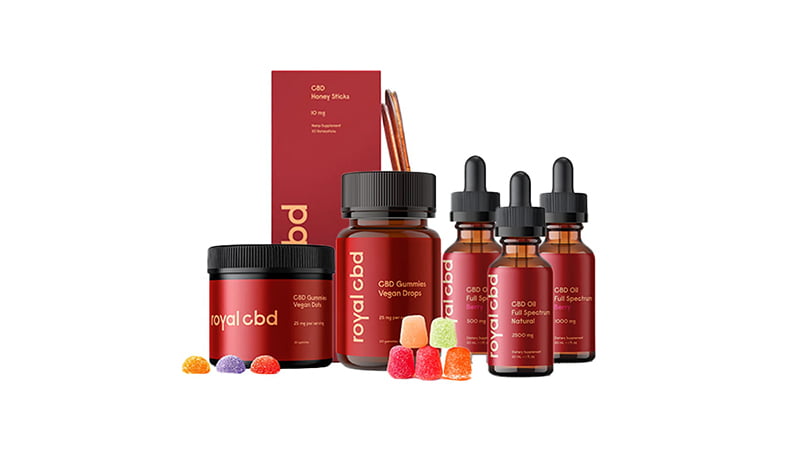
Get 15% off all Area 52 products. Use code “CFAH” at checkout.
Royal CBD is a premium-grade brand that leaves no room for mediocrity. It specializes in full-spectrum CBD products from organic hemp, including CBD oils, capsules, edibles, topicals, and pet products.
The Royal CBD oil is extracted from terpene-rich strains, contributing to the whole-plant synergy and enhancing the therapeutic efficacy of CBD. You can choose from three different potencies depending on your dosage, up to 2,500 mg of CBD per bottle (80 mg/mL).
If you’re looking for the best options for anxiety, my picks from Royal CBD include:
- f2500 mg full-spectrum CBD Oil – for severe stress, persistent anxiety, and physical discomfort
- CBD Relief Gummies – the addition of CBC helps improve the communication between neurons and promotes healthy stress response
- Full-spectrum CBD capsules – a more convenient alternative to CBD oil in an easy-to-swallow softgel shell
2. Gold Bee
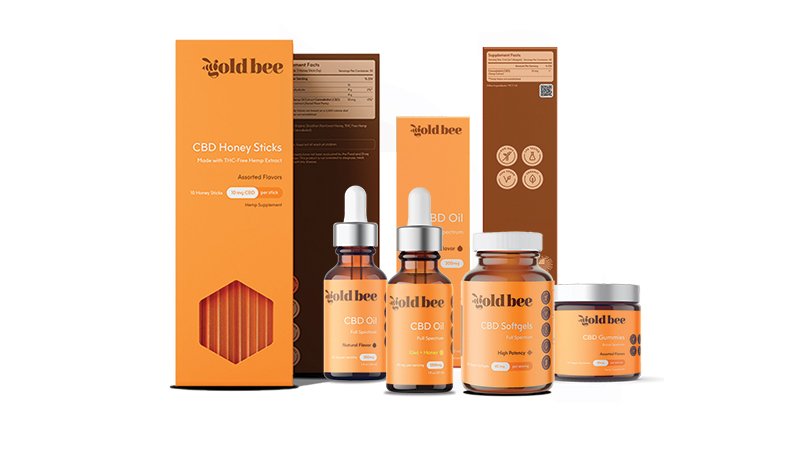
Gold Bee is a former superfoods manufacturer turned CBD brand that makes high-quality CBD products infused with organic MCT oil and raw honey sourced from Brazilian rainforests.
This company offers remarkable transparency and testing integrity, providing up-to-date lab reports from an ISO-certified laboratory. Gold Bee products are tested at different production stages to ensure maximum safety.
From CBD oils to capsules, edibles, and topicals, Gold Bee offers an impressive selection of CBD supplements. The best formulas for anxiety include:
- 2400 mg full-spectrum CBD oil – a potent dose of CBD supported by minor cannabinoids and terpenes can help ease a racing brain, calm the nerves during panic attacks, and slow down the breath to help you relax and shed the stress off your shoulders.
- CBD Sleep Gummies – if anxiety prevents you from getting enough restorative sleep, the blend of CBC, CBN, and melatonin in these sleep gummies will help fix your inner clock by optimizing your stress response and leveling melatonin deficiencies in the evening.
- CBD Softgels – one capsule packs 40 mg of full-spectrum CBD, offering a sugar-free alternative to gummies. Recommended if you limit your sugar intake due to insulin resistance or diabetes.
3. Area 52
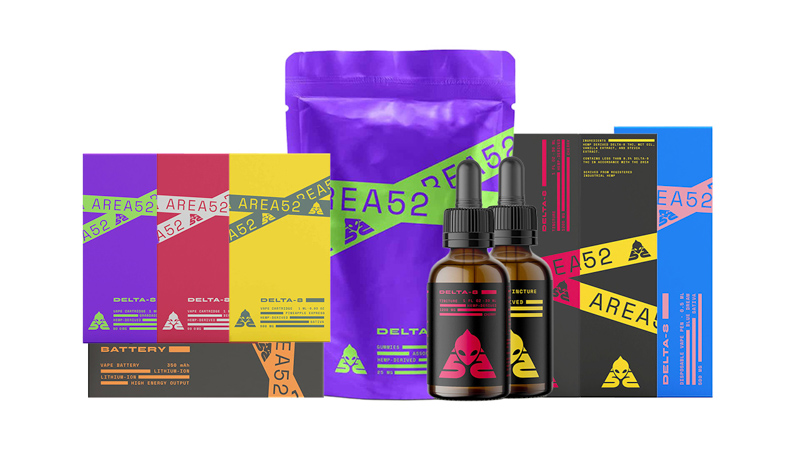
Area 52 is a Nevada-based brand created by scientists, biohackers, and cannabis aficionados. Its products “alienize your mind,” which indicates potential relief from stress and anxiety.
Indeed, there are several products in the company’s collection that can bring a calming wave of relaxation and ease an overstimulated nervous system.
Let’s start with the Area 52 Delta-8 THC supplements.
A quick reminder: delta-8 THC is a milder isomer of delta-9 THC from marijuana. It’s about 50% as potent as delta-9 and comes with a lower incidence of anxiety and paranoia.
It also comes with similar benefits, such as relief from anxiety, increased appetite, muscle relaxation, and elevated mood.
Area 52 lets you choose from delta-8 THC tinctures, edibles, vapes, and pre-rolled joints. Alternatively, you can check out its full-spectrum CBD oil that combines 40 mg of CBD with 2 mg of delta-8 THC per mL.
Anxiety & Its Health Consequences
The American Psychological Association defines anxiety as a constant, uncontrolled feeling of worry that doesn’t stop. The Centers for Disease Control and Prevention (CDC) reports that around 12% of the U.S. adult population suffers from nervousness or anxiety.
Related: Anxiety Statistics
When these feelings become strong enough to interfere severely with your daily life, it’s possible you may have an anxiety disorder. These are the most common of all mental conditions in the U.S., with 40 million adults affected each year.
Traditional treatments for anxiety include psychotherapy, stress management techniques like meditation, journaling, mindfulness, and supplementation. In severe cases, doctors may recommend medications for short-term relief.
Can Supplements Help Anxiety?
While conventional treatments can be highly effective, they don’t work for all people. In fact, close to 50% of people who undergo common treatments for generalized anxiety disorder won’t succeed with their first-line treatment, such as antidepressants.
Moreover, antidepressants can cause side effects with long-term use, such as weight gain, fatigue, loss of libido, and severe withdrawals upon cessation.
Around 40% of people with moderate anxiety disorders say they seek relief in complementary and alternative treatments, like supplements and other natural remedies.
So, the short answer to this question is yes, supplements may help anxiety to some extent, but their efficacy depends on the severity of your disorder. It’s always recommended to consult your doctor before trying new supplements in your routine.
What to Look For in Anxiety Supplements
If you want to research the market of supplements for anxiety on your own, you’ll be spoiled for choice.
Here are some key things to remember when you’re searching for a high-quality product:
- Reputable manufacturer
- Quality ingredients
- Well-thought-out formulas
- Certifications from third-party laboratories
- High level of transparency
- Positive user reviews
Because the FDA doesn’t regulate nutritional supplements to the same degree as medications, third-party lab reports are especially important.
Supplements for Anxiety: Why Does a Personalized Approach Matter?
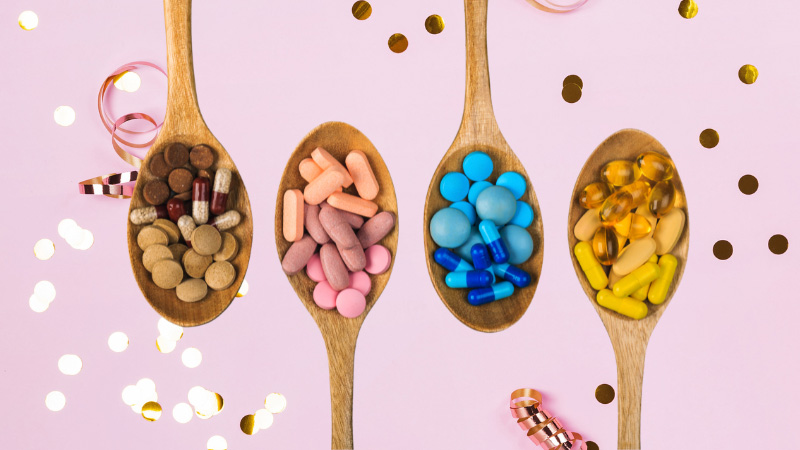
Anxiety manifests itself differently in two people with the same diagnosis.
One may experience major symptoms (palpitations) when stressed, and another may feel physically calm but struggle with racing thoughts.
A supplement that addresses the nervous system components that modulate our “fight-or-flight” response may help a person with physiological symptoms. But this same supplement may be useless for someone with emotional anxiety.
That’s why there are no cure-all solutions or one-size-fits-all dosages of supplements for anxiety.
Supplements, as the name suggests, are supplementary. If you have a vitamin or mineral deficiency, you may consider supplements to fix them, but the ultimate goal is to provide a sufficient number of nutrients so that you don’t need supplements in the first place.
Long story short, natural supplements for anxiety may help some people, especially those who:
- Have mild and occasional symptoms
- Don’t find relief in medication
- Haven’t responded to previous treatments
- Struggle with nutrient deficiencies
When to Seek Help
Supplements may suffice in some cases, but severe anxiety may require a help of a therapist or psychiatrist. That’s especially true if the symptoms become overwhelming and affect your daily life.
A mental health professional can create a tailored treatment that may include talk therapy, stress management techniques, lifestyle modifications, or medication.
FAQs
How long does it take for anxiety supplements to work?
The time required for your supplements to produce desired effects can vary. There aren’t any set rules on when to expect the effects to kick in.
Some supplements may start working as early as 30-60 minutes after taking them. Others need more time to level their deficiencies, requiring systematic supplementation for multiple weeks.
For example, a study from 2017 showed that 112 people with depression experienced relief from anxiety and depressive thoughts after taking 248 of magnesium daily for 6 weeks.
The same applies to CBD, which needs to build up in your system to level endocannabinoid deficiencies.
Read the product label for dosage instructions and details on effectiveness. Again, your doctor should be able to answer any question regarding supplementation for anxiety.
Are supplements for anxiety safe?
Supplements for anxiety generally have a decent safety profile, but some factors can increase your risk of unpleasant and dangerous side effects.
The contraindications for using supplements include:
- Pregnancy
- Breastfeeding
- Chronic medical conditions
- Taking prescription medications
A consultation with a healthcare professional will help you determine which supplement is safe for you and how to space the dosage with your medications so that no interactions occur.
Will supplements cure my anxiety?
Although supplements may be helpful in managing some symptoms, they won’t cure your anxiety.
Anxiety often stems from an underlying cause — a more complex problem that sets your nervous system on fire and makes you feel constantly worried.
It’s best to seek the support of a psychotherapist or a doctor to understand your condition and learn how to manage it successfully in the long run.
Can I take anxiety supplements with my prescription medication?
Some supplements can interact with medications and compromise their efficacy.
Others may increase the concentration of the drug in your bloodstream, leading to potentially dangerous side effects.
If you’re taking a prescription medication, it’s important to inform your doctor that you want to add a new supplement to your anxiety treatment plan to avoid potential risks.
Summarizing the Best Natural Supplements for Anxiety
Supplements can be helpful in relieving the symptoms of anxiety and depression. They can be a natural alternative or constitute a more complex treatment plan.
While more research is needed, current studies are yielding promising results. Supplements like CBD, magnesium, vitamin C, vitamin D, chamomile, lavender, and melatonin have been broadly reviewed for their anxiolytic properties.
Despite being safe, anxiety supplements aren’t a magical pill for your mental health problems. They may also not be suitable if you’re pregnant or breastfeeding, or living with a chronic illness.
Always look for the highest-quality supplements out there and consult the topic with a mental health professional for better results and safe treatment.
Related Posts:
Sources:
- Salve, J., Pate, S., Debnath, K., & Langade, D. (2019). Adaptogenic and Anxiolytic Effects of Ashwagandha Root Extract in Healthy Adults: A Double-blind, Randomized, Placebo-controlled Clinical Study. Cureus, 11(12), e6466 (1).
- Coghlan, S., Horder, J., Inkster, B., Mendez, M. A., Murphy, D. G., & Nutt, D. J. (2012). GABA system dysfunction in autism and related disorders: from synapse to symptoms. Neuroscience and biobehavioral reviews, 36(9), 2044–2055. https://doi.org/10.1016/j.neubiorev.2012.07.005 (2).
- Ba, D. M., Gao, X., Al-Shaar, L., Muscat, J. E., Chinchilli, V. M., Beelman, R. B., & Richie, J. P. (2021). Mushroom intake and depression: A population-based study using data from the US National Health and Nutrition Examination Survey (NHANES), 2005-2016. Journal of affective disorders, 294, 686–692 (3).
- de Oliveira, I. J., de Souza, V. V., Motta, V., & Da-Silva, S. L. (2015). Effects of Oral Vitamin C Supplementation on Anxiety in Students: A Double-Blind, Randomized, Placebo-Controlled Trial. Pakistan journal of biological sciences: PJBS, 18(1), 11–18. https://doi.org/10.3923/pjbs.2015.11.18 (4)
- Mazloom, Z., Ekramzadeh, M., & Hejazi, N. (2013). Efficacy of supplementary vitamins C and E on anxiety, depression, and stress in type 2 diabetic patients: a randomized, single-blind, placebo-controlled trial. Pakistan journal of biological sciences: PJBS, 16(22), 1597–1600. https://doi.org/10.3923/pjbs.2013.1597.1600 (5).
- Moritz, B., Schwarzbold, M. L., Guarnieri, R., Diaz, A. P., S Rodrigues, A. L., & Dafre, A. L. (2017). Effects of ascorbic acid on anxiety state and affect in a non-clinical sample. Acta neurobiologiae experimentalis, 77(4), 362–372 (6).
- Boyle, N. B., Lawton, C., & Dye, L. (2017). The Effects of Magnesium Supplementation on Subjective Anxiety and Stress-A Systematic Review. Nutrients, 9(5), 429. https://doi.org/10.3390/nu9050429 (7).
- National Institute of Health. Magnesium: Fact Sheet for Professionals. Available from: https://ods.od.nih.gov/factsheets/Magnesium-HealthProfessional/ (8)
- Parker, G. B., Brotchie, H., & Graham, R. K. (2017). Vitamin D and depression. Journal of affective disorders, 208, 56–61. https://doi.org/10.1016/j.jad.2016.08.082 (9).
- Zhu, C., Zhang, Y., Wang, T., Lin, Y., Yu, J., Xia, Q., Zhu, P., & Zhu, D. M. (2020). Vitamin D supplementation improves anxiety but not depression symptoms in patients with vitamin D deficiency. Brain and behavior, 10(11), e01760 (10).
- Field, D. T., Cracknell, R. O., Eastwood, J. R., Scarfe, P., Williams, C. M., Zheng, Y., & Tavassoli, T. (2022). High-dose Vitamin B6 supplementation reduces anxiety and strengthens visual surround suppression. Human psychopharmacology, 37(6), e2852. https://doi.org/10.1002/hup.2852 (11).
- Young, L. M., Pipingas, A., White, D. J., Gauci, S., & Scholey, A. (2019). A Systematic Review and Meta-Analysis of B Vitamin Supplementation on Depressive Symptoms, Anxiety, and Stress: Effects on Healthy and ‘At-Risk’ Individuals. Nutrients, 11(9), 2232. https://doi.org/10.3390/nu11092232 (12).
- Shafiee, M., Arekhi, S., Omranzadeh, A., & Sahebkar, A. (2018). Saffron in the treatment of depression, anxiety, and other mental disorders: Current evidence and potential mechanisms of action. Journal of affective disorders, 227, 330–337. https://doi.org/10.1016/j.jad.2017.11.020 (13).
- Su, K. P., Tseng, P. T., Lin, P. Y., Okubo, R., Chen, T. Y., Chen, Y. W., & Matsuoka, Y. J. (2018). Association of Use of Omega-3 Polyunsaturated Fatty Acids With Changes in Severity of Anxiety Symptoms: A Systematic Review and Meta-analysis. JAMA network open, 1(5), e182327. https://doi.org/10.1001/jamanetworkopen.2018.2327 (14).
- Mao, J. J., Li, Q. S., Soeller, I., Rockwell, K., Xie, S. X., & Amsterdam, J. D. (2014). Long-Term Chamomile Therapy of Generalized Anxiety Disorder: A Study Protocol for a Randomized, Double-Blind, Placebo-Controlled Trial. Journal of clinical trials, 4(5), 188. https://doi.org/10.4172/2167-0870.1000188 (15).
- Mao, J. J., Xie, S. X., Keefe, J. R., Soeller, I., Li, Q. S., & Amsterdam, J. D. (2016). Long-term chamomile (Matricaria chamomilla L.) treatment for generalized anxiety disorder: A randomized clinical trial. Phytomedicine: international journal of phytotherapy and phytopharmacology, 23(14), 1735–1742. https://doi.org/10.1016/j.phymed.2016.10.012 (16).
- Donelli, D., Antonelli, M., Bellinazzi, C., Gensini, G. F., & Firenzuoli, F. (2019). Effects of lavender on anxiety: A systematic review and meta-analysis. Phytomedicine: international journal of phytotherapy and phytopharmacology, 65, 153099. https://doi.org/10.1016/j.phymed.2019.153099 (17).
- Larsen, C., & Shahinas, J. (2020). Dosage, Efficacy, and Safety of Cannabidiol Administration in Adults: A Systematic Review of Human Trials. Journal of clinical medicine research, 12(3), 129–141 (18).
- Szejko, N., Fremer, C., & Müller-Vahl, K. R. (2020). Cannabis Improves Obsessive-Compulsive Disorder-Case Report and Review of the Literature. Frontiers in psychiatry, 11, 681 (19).
- Iffland, K., & Grotenhermen, F. (2017). An Update on Safety and Side Effects of Cannabidiol: A Review of Clinical Data and Relevant Animal Studies. Cannabis and cannabinoid research, 2(1), 139–154. https://doi.org/10.1089/can.2016.0034 (20).
- Brown, J. D., & Winterstein, A. G. (2019). Potential Adverse Drug Events and Drug-Drug Interactions with Medical and Consumer Cannabidiol (CBD) Use. Journal of clinical medicine, 8(7), 989. https://doi.org/10.3390/jcm8070989 (.21)